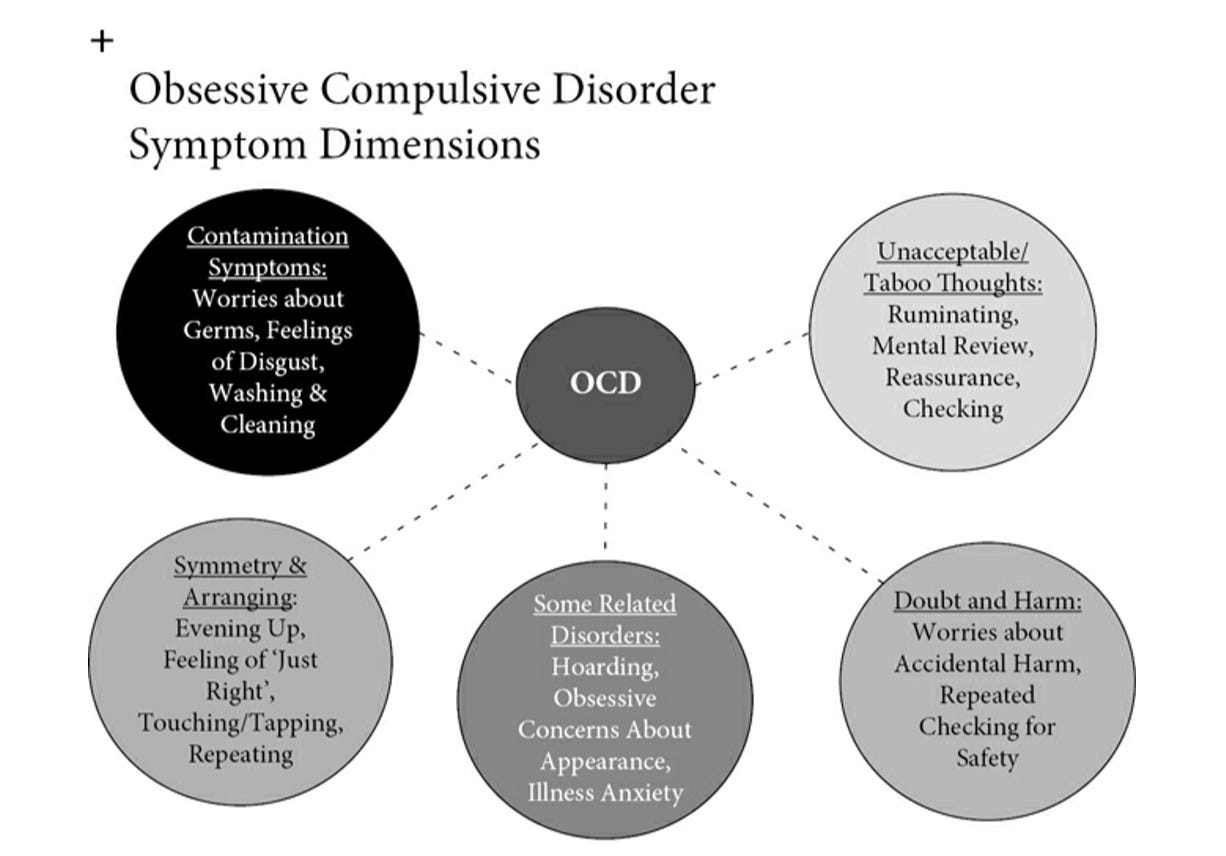When You Shouldn't Take Every Thought Captive
Constant intrusive thoughts are a sign of OCD and should not be addressed by "taking every thought captive."
I have been amazed at how many people I have been counseling who have had bad experiences with Christians about their OCD and are misunderstood. I wrote earlier about how Christians often misdiagnose spiritual OCD as a theological problem of assurance or just having a tender conscience. OCD sufferers are even praised for being so concerned about their sinfulness and seen as more spiritual with their lists of rituals. But when the condition is treated this way, it leads to being enslaved to a vicious cycle of obsessions and compulsions and missing the joy and freedom of the Christian life.
Understanding OCD
As I do more research, I am afraid there are so many more people suffering from these thoughts without getting help. It is estimated that 2.5–4% of the population suffers from OCD, which is a huge number, and much of it is unreported because of shame. Much of the obsessive thoughts have to do with taboo issues such as sexuality or violence, and most people don’t want to reveal something that would make others think they are crazy. However, going untreated means horrible suffering.
According to Andrew Huberman, OCD is the seventh most debilitating disease, and not just among psychiatric disorders but all diseases, including cancer, and asthma. It requires hours a day of the sufferer’s time to work through their obsessions and compulsions, and he or she is unable to be mentally engaged most of the time because it is so consuming. OCD means unwanted thoughts constantly coming, anxiety about these, and helplessness to just practice the obsession as a result of the anxiety.

There are several categories of OCD but could be summarized into 3:
1) Checking – The stove and the locks (going back not just once but 20–30 times).
2) Repetition – Counting off certain numbers, needing to walk a certain number of steps.
3) Order – Incompleteness is hard if something is not right. It could be an email or the way the table is set. Disgust at dirtyness is in this category as well as spiritual dirtyness. Intrusive thoughts pop up because the sufferer is afraid they are a morally terrible person.
Diagnosis is very important, and practitioners use the Yale-Brown-Obsessive-Compulsive-Scale-Y to determine whether someone has true OCD. With true OCD, no logic - or theology - can resolve the obsession. And every time they engage in the obsession with a compulsion, the more powerful the obsession becomes. The sufferer knows that their beliefs are irrational. He or she knows that she just washed her hands 30 times or that it would be okay to turn left, but the anxiety is so strong, that she simply can’t stop on her own. Tons of people could assure a person that she is not going to sexually abuse her child, but that won’t convince the person. The intrusive thoughts will merely pop up again and again.

When Spiritual Solutions Fail
I met with a new counselee recently who told me she had been going to a biblical counselor for her spiritual OCD, and the counselor was giving her “truth worksheets,” where she was supposed to quickly change her thoughts and suppress her fears about her salvation through Bible verses. But this well-meaning counselor was effectively telling her to perform the obsession and compulsion over and over, so her obsession became more powerful and worse over the year of counseling. It was like scratching an itch that will just become more itchy the more you scratch it.
The amazing thing is that there has been so much research done on the neural circuitry of the brain that has OCD. There are certain circuits that are very active in OCD called “go behaviors” and “no-go behaviors,” and these are on fire. You can’t just reach into your brain and turn it off, however, certain treatments might work at some stage of the illness rather than others. For example, medication can be crucial to being able to do any kind of cognitive work on OCD.
The main treatment plan for OCD is fear exposure (exposure and response prevention). When you are bringing up someone’s fear, you normally help regulate their anxiety and calm it down, but with this kind of exposure therapy, you want the person to raise their anxiety to the highest and feel it and actually tolerate it. Then you help them do exactly the opposite of the compulsion and experience the utmost anxiety. (Turn left rather than right and tolerate the anxiety). This needs to be done in a supportive, clinical setting, but then “homework” is also very important for OCD because the security of a counseling session can help people tolerate their anxiety much more than being at home. Going back home is often when people go back to their obsessions and compulsions, so sometimes a clinician will do a home visit or help someone in a specific place. Particular places can provoke the most anxiety.
The compulsion to avoid anxiety is such a driving powerful force that being able to tolerate anxiety, sit with it, and not do the obsession is the treatment. I’ve read that it requires 15 exposure sessions done twice a week or more, which is a large commitment but can decrease OCD incredibly.
“As a man thinketh in his heart, so is he?”
In my counseling experience, where Christians especially get tripped up is the “thought-action fusion,” where having had an intrusive thought, they feel like they have actually done the action. If they have a horrific thought of abusing a child, they are a pedophile.
The tricky part is that when someone “blasphemes” God or has a “lustful” thought, Scripture seems to say that this is a sin in itself. Jesus says, “But I say to you that everyone who looks at a woman with lustful intent has already committed adultery with her in his heart” (Matt. 5:28). This sounds very alarming because it seems to imply that merely having a sexual thought or a blasphemous word about God is a sin.
However, psychology helpfully distinguishes thought from action in the cases of intrusive thoughts. Growing up, I remember hearing the phrase from Proverbs 23:7 that says, “For as he thinketh in his heart, so is he,” (KJV) but I was shocked to read the ESV verse in context. The Proverb is about a totally different situation about someone not having their heart in it: “for he is like one who is inwardly calculating ‘Eat and drink!’ he says to you, but his heart is not with you.” This has to be one of the most misused verses taken out of context.
Thankfully, we are not our thoughts, and it can be helpful to remember what the intent is in these intrusive thoughts. Someone with OCD does not want to commit pedophilic acts or commit suicide, they are merely being plagued by worst-case scenarios over and over because of their brain circuitry. As this article puts it, “The fact that symptoms (thoughts, images, sensations) cause distress, are unwanted, and go against the person’s value system are all important factors.” Matthew 5:28 about lustful thoughts is about “lustful intent” not just having terrifying images and thoughts come to mind.
Exposure-response prevention in the cases of thoughts is difficult because it is so internal, unlike contamination. It is also difficult in the areas of “sin” such as homosexual thoughts because the obsession is seen as a sin and needs to be repented of right away. However, the key here is to separate out the intrusive thought from action (sin). A homosexual desirous thought popping into your mind is not a sin but a temptation to sin and does not need to be dealt with or swatted down. Swatting it down by repenting is practicing the compulsion in the enslaving loop. Once it is let go, the power and terror of the thoughts decreases and stops recurring as frequently.
I use the analogy of bubbles that pass you by, and you can either choose to pop them yourself and get yourself into a big mess of stickiness or you can choose to let them float by and pop on their own. The intrusive thoughts need to just pass you by without being dealt with as sin, and they will lose their power over you.
Many counselees are terrified that they might miss a sin that they need to repent of in these scenarios. However, these rituals are merely attempts at works-righteousness and saving yourself rather than depending on Christ. Psalm 103 and 139 have also been comforting to people, when it says “For he knows our frame; he remembers that we are dust” (Ps. 103:14). Even if we can’t splice out exactly what is biological and what is actual sin, God knows our frame and that we are but dust. He knows our mental health conditions and how weak we are. “As a father has compassion on his children, so the LORD has compassion on those who fear Him” (Ps. 103:13).
Neurodivergent Christians
Knowing about the basics of OCD can help us be more aware of the immense suffering taking place within peoples’ minds and that you can’t give them a quick fix. I have so appreciated being a counselor to see how incredibly differently we experience life. “Neurodivergence” is the term many use to explain that are brains are wired differently, and we cannot expect others to think and be just like us.
While the term OCD can be tossed around lightly (“I can be OCD about this”) or laughed at (Monk is a great show!), it involves a lot of complications and suffering for those who have the specific diagnosis. Having a basic understanding of it can help us show the same compassion God shows us in knowing others’ “frame.”
If you are interested in learning more or signing up for counseling online, schedule with me or one of the other wonderful counselors at Anchored Hope Biblical Counseling here.






This was awesome, Anna.
Outstanding piece, Anna. This is a critical topic, and you've written on it wisely and clearly.